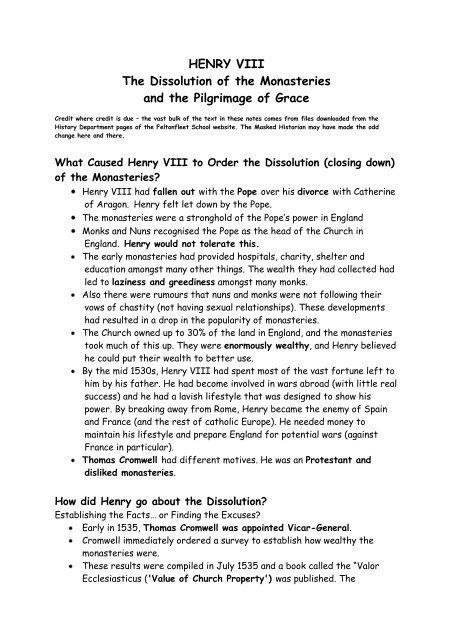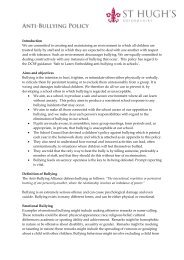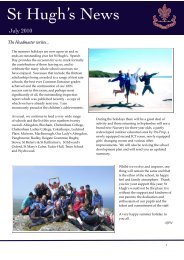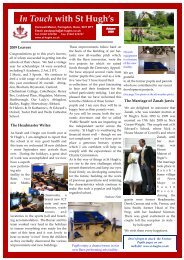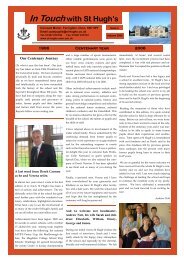HENRY VIII The Dissolution of the Monasteries and the ... - St Hughs
HENRY VIII The Dissolution of the Monasteries and the ... - St Hughs
HENRY VIII The Dissolution of the Monasteries and the ... - St Hughs
You also want an ePaper? Increase the reach of your titles
YUMPU automatically turns print PDFs into web optimized ePapers that Google loves.
<strong>HENRY</strong> <strong>VIII</strong><br />
<strong>The</strong> <strong>Dissolution</strong> <strong>of</strong> <strong>the</strong> <strong>Monasteries</strong><br />
<strong>and</strong> <strong>the</strong> Pilgrimage <strong>of</strong> Grace<br />
Credit where credit is due – <strong>the</strong> vast bulk <strong>of</strong> <strong>the</strong> text in <strong>the</strong>se notes comes from files downloaded from <strong>the</strong><br />
History Department pages <strong>of</strong> <strong>the</strong> Feltonfleet School website. <strong>The</strong> Masked Historian may have made <strong>the</strong> odd<br />
change here <strong>and</strong> <strong>the</strong>re.<br />
What Caused Henry <strong>VIII</strong> to Order <strong>the</strong> <strong>Dissolution</strong> (closing down)<br />
<strong>of</strong> <strong>the</strong> <strong>Monasteries</strong>?<br />
Henry <strong>VIII</strong> had fallen out with <strong>the</strong> Pope over his divorce with Ca<strong>the</strong>rine<br />
<strong>of</strong> Aragon. Henry felt let down by <strong>the</strong> Pope.<br />
<strong>The</strong> monasteries were a stronghold <strong>of</strong> <strong>the</strong> Pope’s power in Engl<strong>and</strong><br />
Monks <strong>and</strong> Nuns recognised <strong>the</strong> Pope as <strong>the</strong> head <strong>of</strong> <strong>the</strong> Church in<br />
Engl<strong>and</strong>. Henry would not tolerate this.<br />
<strong>The</strong> early monasteries had provided hospitals, charity, shelter <strong>and</strong><br />
education amongst many o<strong>the</strong>r things. <strong>The</strong> wealth <strong>the</strong>y had collected had<br />
led to laziness <strong>and</strong> greediness amongst many monks.<br />
Also <strong>the</strong>re were rumours that nuns <strong>and</strong> monks were not following <strong>the</strong>ir<br />
vows <strong>of</strong> chastity (not having sexual relationships). <strong>The</strong>se developments<br />
had resulted in a drop in <strong>the</strong> popularity <strong>of</strong> monasteries.<br />
<strong>The</strong> Church owned up to 30% <strong>of</strong> <strong>the</strong> l<strong>and</strong> in Engl<strong>and</strong>, <strong>and</strong> <strong>the</strong> monasteries<br />
took much <strong>of</strong> this up. <strong>The</strong>y were enormously wealthy, <strong>and</strong> Henry believed<br />
he could put <strong>the</strong>ir wealth to better use.<br />
By <strong>the</strong> mid 1530s, Henry <strong>VIII</strong> had spent most <strong>of</strong> <strong>the</strong> vast fortune left to<br />
him by his fa<strong>the</strong>r. He had become involved in wars abroad (with little real<br />
success) <strong>and</strong> he had a lavish lifestyle that was designed to show his<br />
power. By breaking away from Rome, Henry became <strong>the</strong> enemy <strong>of</strong> Spain<br />
<strong>and</strong> France (<strong>and</strong> <strong>the</strong> rest <strong>of</strong> catholic Europe). He needed money to<br />
maintain his lifestyle <strong>and</strong> prepare Engl<strong>and</strong> for potential wars (against<br />
France in particular).<br />
Thomas Cromwell had different motives. He was an Protestant <strong>and</strong><br />
disliked monasteries.<br />
How did Henry go about <strong>the</strong> <strong>Dissolution</strong>?<br />
Establishing <strong>the</strong> Facts… or Finding <strong>the</strong> Excuses?<br />
Early in 1535, Thomas Cromwell was appointed Vicar-General.<br />
Cromwell immediately ordered a survey to establish how wealthy <strong>the</strong><br />
monasteries were.<br />
<strong>The</strong>se results were compiled in July 1535 <strong>and</strong> a book called <strong>the</strong> “Valor<br />
Ecclesiasticus ('Value <strong>of</strong> Church Property') was published. <strong>The</strong>
monasteries were valued at £100,000 a year from l<strong>and</strong> <strong>and</strong> £25,000 from<br />
o<strong>the</strong>r means.<br />
Later in <strong>the</strong> year, Commissioners (inspectors) visited <strong>the</strong> monasteries to<br />
investigate <strong>the</strong> rumours about idleness, greed <strong>and</strong> bad behaviour.<br />
<strong>The</strong>y reported back that <strong>the</strong> monasteries were 'idle, corrupt <strong>and</strong><br />
useless'.<br />
<strong>The</strong>re were allegations <strong>of</strong> monks fa<strong>the</strong>ring children <strong>and</strong> <strong>of</strong> monks getting<br />
married.<br />
Henry <strong>and</strong> Cromwell now had <strong>the</strong> evidence <strong>the</strong>y needed to act. Some did<br />
however report back that ' religion is well kept <strong>and</strong> observed'.<br />
Cromwell had favourable reports re-written to place more emphasis on<br />
faults.<br />
<strong>Dissolution</strong> <strong>of</strong> <strong>The</strong> Smaller <strong>Monasteries</strong>,1536.<br />
In 1536, Parliament passed an Act that permitted <strong>the</strong> dissolution <strong>of</strong> all<br />
monasteries that had an income <strong>of</strong> less than £200 a year.<br />
376 monasteries were closed.<br />
2000 monks were pensioned <strong>of</strong>f or sent to larger monasteries or<br />
nunneries.<br />
Henry <strong>and</strong> Cromwell were very cautious <strong>and</strong> calculating. <strong>The</strong>y deliberately<br />
chose <strong>the</strong> smaller monasteries first in order to test public opinion <strong>and</strong><br />
because <strong>the</strong>y felt that <strong>the</strong> Tudor treasury was not yet ready to cope with<br />
<strong>the</strong> larger amounts <strong>of</strong> money that would come from <strong>the</strong> larger<br />
monasteries.<br />
<strong>The</strong>re were few complaints <strong>and</strong> <strong>the</strong> closures passed relatively peacefully.<br />
However… not everyone was happy to see <strong>the</strong> monasteries go. Henry faced a<br />
rebellion sparked by <strong>the</strong> closure <strong>of</strong> <strong>the</strong> smaller monasteries. This was called<br />
<strong>the</strong> Pilgrimage <strong>of</strong> Grace.<br />
<strong>The</strong> Pilgrimage <strong>of</strong> Grace, 1536.<br />
In <strong>the</strong> south <strong>and</strong> east <strong>of</strong> Engl<strong>and</strong> little opposition was seen against <strong>the</strong><br />
dissolutions.<br />
However in <strong>the</strong> north things were different.<br />
Two rebellions broke out, one in Lincolnshire <strong>and</strong> one in Yorkshire.<br />
<strong>The</strong> rebellion in Lincolnshire was easily dealt with, because it lacked<br />
leaders <strong>of</strong> any quality. 50 rebels were executed.<br />
However, <strong>the</strong> Yorkshire rebels were a different matter. Robert Aske, a<br />
lawyer <strong>and</strong> l<strong>and</strong>owner managed to get toge<strong>the</strong>r an army <strong>of</strong> 30,000.<br />
<strong>The</strong>y adopted a banner showing <strong>the</strong> five wounds <strong>of</strong> Christ.<br />
He referred to his followers as pilgrims <strong>and</strong> not rebels.
Priests <strong>and</strong> monks joined <strong>the</strong> rebellion. <strong>The</strong>y were doing God's work.<br />
Aske wanted no killing or stealing.<br />
By October 24th, Aske <strong>and</strong> his army had captured York, <strong>and</strong> were joined<br />
by <strong>the</strong> Archbishop <strong>of</strong> York, <strong>and</strong> Thomas Darcy, a powerful local Baron.<br />
<strong>The</strong> Pilgrimage <strong>of</strong> Grace made <strong>the</strong> following dem<strong>and</strong>s:<br />
1. <strong>The</strong> return <strong>of</strong> <strong>the</strong> Pope's power in Engl<strong>and</strong>.<br />
2. <strong>The</strong> removal <strong>of</strong> Cromwell from power.<br />
3. <strong>The</strong> immediate stop to <strong>the</strong> dissolution <strong>of</strong> <strong>the</strong> monasteries.<br />
4. Parliament was to be called to discuss new laws <strong>and</strong> to look into poverty in<br />
<strong>the</strong> north <strong>of</strong> Engl<strong>and</strong>.<br />
5. Princess Mary Tudor to be renamed as heir to <strong>the</strong> throne.<br />
6. <strong>The</strong> punishment <strong>of</strong> those Commissioners responsible for writing bad reports<br />
on <strong>the</strong> monasteries.<br />
Henry had an army <strong>of</strong> only 8000 in <strong>the</strong> north <strong>and</strong> this was not large<br />
enough to deal with <strong>the</strong> rebellion.<br />
He had to stall Aske <strong>and</strong> play for time.<br />
He sent Thomas Howard, <strong>the</strong> Duke <strong>of</strong> Norfolk to discuss terms with<br />
Aske.<br />
He agreed to all <strong>the</strong> dem<strong>and</strong>s that Aske made saying that nobody who<br />
took part in <strong>the</strong> rebellion would be punished.<br />
A few days later, Henry met Aske, <strong>and</strong> even gave him a gold chain as a<br />
sign <strong>of</strong> friendship <strong>and</strong> said that Aske could have everything he wanted so<br />
long as <strong>the</strong> Aske's followers went back to <strong>the</strong>ir homes.<br />
In truth, Henry had no intention <strong>of</strong> keeping his side <strong>of</strong> <strong>the</strong> bargain,<br />
despite <strong>the</strong> faith which Aske had put in Henry's word.<br />
Aske dismissed his army, <strong>and</strong> <strong>the</strong>n Henry acted by sending his army into<br />
Yorkshire.<br />
Aske was captured <strong>and</strong> held in prison for 6 months. He was <strong>the</strong>n<br />
dragged through <strong>the</strong> streets <strong>of</strong> York <strong>and</strong> <strong>the</strong>n left to hang from a tree,<br />
loaded with heavy chains. He took three days to die.<br />
Henry ordered that one man should be hanged from every village that had<br />
taken part or supported <strong>the</strong> rebellion.<br />
Over 200 rebels including some monks were hanged.<br />
<strong>The</strong> o<strong>the</strong>r leaders were also executed.<br />
<strong>The</strong> pilgrimage achieved nothing <strong>and</strong> received no support from o<strong>the</strong>r<br />
parts <strong>of</strong> <strong>the</strong> country.
What were <strong>the</strong> consequences <strong>of</strong> <strong>the</strong> failure <strong>of</strong> <strong>the</strong><br />
Pilgrimage <strong>of</strong> Grace?<br />
It sealed <strong>the</strong> fate <strong>of</strong> <strong>the</strong> monasteries in Engl<strong>and</strong>.<br />
<strong>The</strong> involvement <strong>of</strong> monks in <strong>the</strong> rebellion gave Henry <strong>and</strong> Cromwell<br />
fur<strong>the</strong>r ammunition <strong>and</strong> excuses for <strong>the</strong>ir continued programme <strong>of</strong><br />
dissolutions.<br />
A 'Council <strong>of</strong> <strong>the</strong> North' was set up to rule <strong>the</strong> north <strong>of</strong> Engl<strong>and</strong>.<br />
No more rebellions took place in Henry’s reign. He had dealt with <strong>the</strong><br />
Pilgrimage <strong>of</strong> Grace with cunning, deceit <strong>and</strong> great brutality. <strong>The</strong> 200<br />
executions were a warning to those that challenged Henry’s authority.<br />
<strong>The</strong> <strong>Dissolution</strong> <strong>of</strong> <strong>The</strong> Larger <strong>Monasteries</strong>, 1539.<br />
in 1539, Cromwell <strong>and</strong> Henry ordered <strong>the</strong> closure <strong>of</strong> 645 larger<br />
monasteries.<br />
<strong>The</strong> Abbots <strong>of</strong> Woburn, Glastonbury, Colchester <strong>and</strong> Reading all<br />
attempted to resist <strong>the</strong> closures. A mistake! All <strong>of</strong> <strong>the</strong>m were hanged at<br />
<strong>the</strong> gates <strong>of</strong> <strong>the</strong>ir monasteries in order to teach a lesson to o<strong>the</strong>r would<br />
be troublemakers.<br />
<strong>The</strong> Abbot <strong>of</strong> Glastonbury was dragged through <strong>the</strong> town, hanged,<br />
beheaded <strong>and</strong> his head impaled on his abbey gates.<br />
<strong>The</strong> buildings on monasteries were stripped <strong>of</strong> doors, lead, timber, glass,<br />
art <strong>and</strong> literature, gold plate, silver, gold <strong>and</strong> jewellery. Livestock was<br />
seized.<br />
L<strong>and</strong> was sold to <strong>the</strong> wealthy who fell over <strong>the</strong>mselves to buy it up. <strong>The</strong><br />
buildings were bought by <strong>the</strong> wealthy who turned some into fine country<br />
houses. If buildings were not sold, <strong>the</strong>y were used as quarries where<br />
individual stones were sold <strong>of</strong>f to local builders.<br />
Thomas Cromwell was a ruthless man <strong>and</strong> <strong>the</strong> plans were carried out in a<br />
very efficient, if bullying manner.<br />
What Effect Did <strong>The</strong> <strong>Dissolution</strong>s have in Engl<strong>and</strong>?<br />
Henry <strong>VIII</strong> now had an enormous amount <strong>of</strong> additional money. <strong>The</strong><br />
<strong>Dissolution</strong>s provided him in an EXTRA £140,000 a year between 1536<br />
<strong>and</strong> 1547. Henry’s normal income was £100,000 a year.<br />
Much <strong>of</strong> this money went towards <strong>the</strong> construction <strong>of</strong> Henry's Royal Navy<br />
<strong>and</strong> <strong>the</strong> building <strong>of</strong> new fortifications on <strong>the</strong> south coast <strong>and</strong> <strong>the</strong> casting<br />
<strong>of</strong> new cannons for ships <strong>and</strong> forts.<br />
Henry gained an enormous amount <strong>of</strong> l<strong>and</strong>. However, he needed money<br />
urgently to fund <strong>the</strong> war with France <strong>and</strong> Scotl<strong>and</strong>. <strong>The</strong>refore he sold <strong>the</strong>
l<strong>and</strong> to over 40,000 people including nobles, merchants <strong>and</strong> self-made<br />
men.<br />
Henry squ<strong>and</strong>ered <strong>the</strong> money on futile, fairly unsuccessful wars.<br />
If he had held on to <strong>the</strong> l<strong>and</strong> it would have provided him with a larger<br />
amount <strong>of</strong> money over many years.<br />
Henry had, by accident, created a group <strong>of</strong> l<strong>and</strong>owners who would always<br />
be opposed to <strong>the</strong> return <strong>of</strong> <strong>the</strong> Catholic faith. <strong>The</strong>y would be unwilling to<br />
give up <strong>the</strong> monastery l<strong>and</strong> <strong>the</strong>y had bought.<br />
7000 monks were pensioned <strong>of</strong>f. Even in 1551, this pension scheme was<br />
costing <strong>the</strong> treasury £44,000 a year.<br />
Most monks were treated well.<br />
Abbots lost <strong>the</strong>ir seats in Parliament.<br />
Some monks went to work in local parish churches.<br />
O<strong>the</strong>r monks w<strong>and</strong>ered around <strong>the</strong> country as vagabonds.<br />
Many <strong>of</strong> <strong>the</strong> people employed by monasteries found <strong>the</strong>mselves without<br />
jobs <strong>and</strong> <strong>the</strong>y too became vagabonds. Unemployment <strong>and</strong> poverty<br />
increased. This was worse in <strong>the</strong> north <strong>of</strong> Engl<strong>and</strong> (where <strong>the</strong> Pilgrimage<br />
<strong>of</strong> Grace had started).<br />
<strong>The</strong> closure <strong>of</strong> <strong>the</strong> monasteries resulted in a reduction <strong>of</strong> hospitals,<br />
schools, places <strong>of</strong> accommodation, <strong>and</strong> care for <strong>the</strong> poor.<br />
In some places where <strong>the</strong> monastery was <strong>the</strong> centre <strong>of</strong> life, <strong>the</strong><br />
community collapsed.<br />
Sheep farming increased, producing enormous pr<strong>of</strong>its for l<strong>and</strong>owners.<br />
Sheep farming requires fewer workers <strong>and</strong> <strong>the</strong>refore this situation also<br />
added to <strong>the</strong> unemployment problem.<br />
<strong>The</strong> dissolutions resulted in <strong>the</strong> loss <strong>of</strong> works <strong>of</strong> art <strong>and</strong> literature that<br />
were destroyed.<br />
Beautiful buildings were left ransacked <strong>and</strong> left to scar <strong>the</strong> countryside<br />
for centuries.<br />
<strong>The</strong> last strongholds <strong>of</strong> <strong>the</strong> power <strong>of</strong> <strong>the</strong> Pope were destroyed. Henry now<br />
had complete control over <strong>the</strong> Church in Engl<strong>and</strong>.


